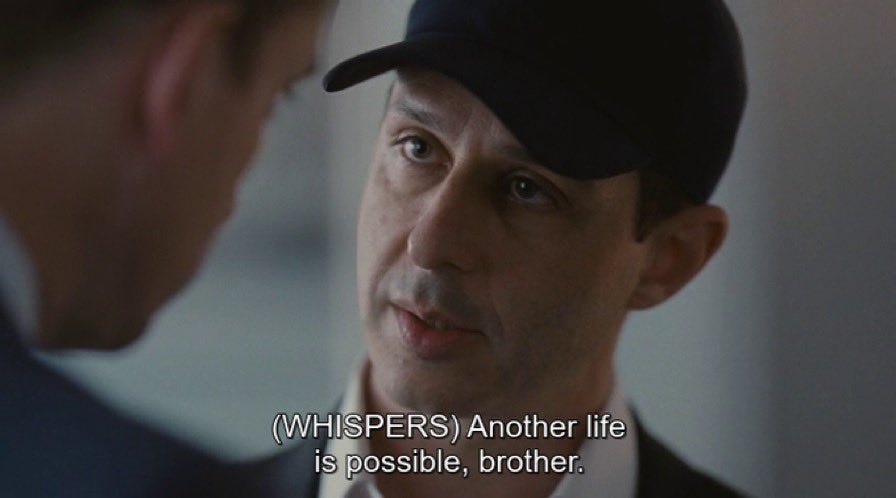Boom: The Gospel of Progress
Review of Byrne Hobart's and Tobias Huber's hyperstitious manifesto
Should we withdraw in fear from the next step, should we substitute temporary material welfare for spiritual adventure. . . ? Then will Man fall back from his destiny, the mighty surge of his achievement will be lost, and the confines of this planet will destroy him.
— George Mueller, the director of NASA’s manned spaceflight program
By orienting the present toward a definite, hyperstitional vision of the future, bubbles can coordinate the relentless search for secrets that, when uncovered, will yield enormous scientific, technological, and economic breakthroughs. Only through these discoveries will we be able to reach escape velocity from stagnation and break from the contemporary order, which is our only hope to arrest and reverse society’s entropic tendencies.
— Byrne Hobart and Tobias Hubert, Boom
It is profoundly important for religious reasons that [mankind] travel to other worlds, other galaxies; for it may be Man’s destiny to assure immortality, not only of his race but even of the life spark itself.
— Wernher von Braun, German V2 missile engineer and Apollo program architect
Related: We are as gods
Fans of Byrne Hobart will be familiar with his generative mind and vast output at the intersection of finance and technology. Erudite and quick, measured, and always apolitical. (I’m less familiar with his co-author Tobias Huber).
In Boom: Bubbles and the End of Stagnation, Hobart quits politely vacillating, awakening as a giant from slumber, and comes firmly down on the side of progress. He preaches from the pulpit to us complacent heathens — awake from thy slumbers! We are in an Age of Stagnation, believe in thy Lord Progress or condemn thyself to Eternal Doom! His call is messianic and nothing less than the Apocalypse is at stake. You, the Last Man, are a worm:
Empire-building is restricted to strategy games, romantic conquests are substituted with virtual-reality porn, and the drive for greatness and heroism is passively sublimated into the latest Marvel movie.
Fortunately, Redemption is possible — we need only Will it. He pleads with the Promethean spirit simmering within each of us. Wake up! Forsake the false gods of Endless Optionality and Incremental Innovation. Unite behind the singular visions of Great Men to bend the universe to your Will! If you will it, it is no dream.
Boom may be the most Thielian book to date (yes, more Thielian even than Peter Thiel’s own Zero to One). A treatise on stagnation in the world of atoms, the derangements of modern science and higher education1, and Girardian mimesis and scapegoats, Hobart and Huber firmly announce themselves as Apostles of Thiel. It’s a synthesis of online and offline worlds: obscure-ish online writer Nick Land beside Livy's History of Rome. The authors are as hooked on the same Twitter / X memes we are, they just also read a lot.
Whereas microprocessor performance has doubled roughly every two years since 1975, and computation density has experienced sustained geometrical growth of approximately 35 percent per year for the past 50 years, crop yield, energy density, and transportation speed have more or less stagnated—or worse, declined.
“Demons are more numerous than we are and they surround us like the ridge round a field,” wrote the Babylonian Talmudist Rav Huna in the third century CE. “Every one among us has a thousand on his left hand and ten thousand on his right hand.” This is the world Hobart and Huber unveil. Modern man may have forsaken religion but religion has not forsaken modern man. Boom is in some ways a coming out party for Hobart. At the heart of every finance and tech story is a human one. And at the heart of every human a spirit, a spark of Creation and an image of God. And so any grand story is fundamentally incomplete without a spiritual explanation. And what is grander than the levers of technology that thrust us from the bog to the stars? This is what Hobart and Huber offer. A spiritual diagnosis and a spiritual cure. This is the unlock to Hobart’s corpus to date. No more half-measures.
This metaphysical lens is revealing. If, as Thiel has noted, wokeness is Christianity without forgiveness, Hobart and Huber observe that endless money printing is Christianity without hell (number only goes up!). Technology’s dual use nature carries the potential for both redemption and catastrophe. Declining testosterone levels, declining fertility, and low interest rates are part of a vicious cycle that ensconce our world in safety-ism, a bubble-wrap prison. YOLO carries a hidden truth and an existential depth. Oil is magic: a potion brewed deep within the earth for millions of years to power our civilisation. Plastics are a miracle concoction, rivalling the wildest imaginations of the alchemists. Fracking is a gift from angels bridging the era of fossil fuels to one of abundant clean energy, granted to their earthly champion: the United States of America.
This perspective also works backwards: if a transcendent vision is a necessary (if not sufficient) ingredient to what becomes truly great, then you might start with transcendent visions to find truly great investments. And if Tyler Cowen were to ask Hobart and Huber how are you long transcendence or where’s your hedge fund, well, they do run an investment syndicate that does in fact invest in the earliest stages of the potentially transcendent. They practice what they preach.2
The greatest feats of civilisation were creations of relentless zealots unified behind a singular mission. These feats even said so on the tin. The first manned space mission was called Project Adam. The mission to the moon Apollo. The first Bitcoin the genesis block. The first atomic explosion tests Trinity. Religious messianic fervour is good actually, say Hobart and Huber. “Unified" is a word that keeps coming up again and again. There is no room for diversity commissars in Paradise. Boom’s creed is strictly anti-diversity. The Tower of Babel was a warning against hubris, but at least they built. Their punishment? Diversity. Scattered across place and language. They may have even been subjected to some DEI training in the Midrashim.
Greatness is not democratic. Greatness is not a populist project. It is singular, emanating from the will of a few. Government support is mercurial. Government can be a conduit for greatness (it directly facilitated the Manhattan Project3), but it’s schizophrenic. The US government inflated then deflated the corporate R&D bubble of mid-last century. Its antitrust fervour forced tech giants to innovate internally, but then forbade them from exploiting those inventions.
Greatness emerges from conflict. Much of America’s mid-century drive came from overcoming first the Axis powers then the Soviet Union. Other rivalries also defined each age, such as Apple and Microsoft’s. But no, that’s too general: it came down to the rival wills of a few men:
At one point in the early ’80s, Steve Jobs accused Microsoft of misusing Apple’s intellectual property. Bill Gates replied, “Well, Steve, I think there’s more than one way of looking at it. I think it’s more like we both had this rich neighbor named Xerox and I broke into his house to steal the TV set and found out that you had already stolen it.”
Only the cretin looks upon the Apollo missions with disdain. If the spiritual transcendence and destiny of man thing doesn’t do it for you, how about that it launched Moore’s law, heralding the dawn of the computer age. Hobart and Huber’s contention is that this is no coincidence. We do not know what lies beyond the next mountain. We simply know that we must conquer it.
Just like Thiel said monopolies are good actually, so Hobart and Huber claim bubbles martial the resources, attract and align the talent, and quicken the cojones to deliver singular civilisational breakthroughs. They dissect the anatomy of bubbles and how bubble dynamics were (and are) behind the success of the moon landings, atomic bomb, the computer industry, fracking, Bitcoin, and probably now AI. There was nothing inevitable about these breakthroughs. Whilst they relied on a range of historical contingencies, at their heart also lay the sheer will of great men.
Boom is a paean to the specific over the general. Beware the slothful delusion of indefinite optimism. Instead shape your will to the meridian of definite optimism. Not only is the future not inevitable, its unfolding will be a consequence of singular and specific events. It doesn’t unfold along a statistical distribution; it’s created through a series of calculated leaps. Like plaque to teeth, the general follows the specific. The atomic and space industries followed the Apollo and Manhattan projects, and Crypto followed Bitcoin. These industries are mimetic backfilling: they are not the propulsion drive of civilisation, which are singular, irreproducible leaps into the unknown. The zero to ones.
Belief becomes reality. Is stagnation inevitable? Maybe, but we must fight it anyway. Believing stagnation is inevitable is self-fulfilling. Do not fulfil your own prophesy of doom. As they say in Russian card games, if you don’t deal yourself a good hand, who will?
While Hobart and Huber mine the eschatological underpinnings of progress, they imply an extended universe of religious impulses in progress’s opponents. The corruption in ESG Indulgences. The climate freaks and degrowthers who are also spirited — albeit demonic. Decarbonising is not enough — it must be accompanied by punishment, withdrawal, self-denial. Tech driven decarbonisation misses the point of self-flagellation and repentance. If the peaks of our civilisation’s greatness were Apollyon thrusts skyward propelled by Davidian Messianic fervour, we have reverted to more primitive idolatries: child sacrifice to Moloch, ersatz Aztec flower wars bred of calcified mega-bureaucracies. Researchers now spend over 40% of their time writing grant applications, less productive even than Aztec subjects who spent a third of their time in religious ceremony. Science is fake and grey. The Hero-Scientist has been subsumed into a hive mind of geriatric consensus-over-truth mean-girl scientism. The tyranny of bureaucracy, the uber-conformity of peer review, the cargo-culting of science: these are not mere effects of a post-gold standard world. These too are the result of the same idolatrous impulse that Abraham rebelled against and Moses found descending from Mount Sinai. We dance with the likes of Moloch, Belial and Mammon. This is the anti-Christ. This is the Apocalypse that we must avoid. We have to go back. Embrace Achillean scientism: the singular glory of the will. Sustainability? Calcification of progress. Institutional attempts to reduce volatility merely embalm our world in stasis. The only way out is through. One-off novel leaps powered by the will of great men and collective delusions: bubbles.
This manifesto doesn’t neatly align with left or right wing politics. Sure, the Nietzschean right feel at home with the centering of agency and greatness. But Hobart and Huber’s lambasting of super-financialisation and the banality of self-serving index-investing Laptopistas would be equally welcome on the left. They transcend the two wings of politics that mimetically reflect each other’s derangements. They chart a third path: the technologically sublime. New frontiers and technological cathedrals to awe us into multi-generational efforts. A rupture in the current paradigm of malaise. Retvrn to the pre-Woodstock unity of will and purpose that thrust man to the moon, unlocked the atom, and launched the computer revolution. Exorcise thy solipsism! Rid thyself of rumination! Look up from your social media slop to the immortal possibilities of the heavens and herald the Messianic Age.
Loved loved loved this:
A 15th-century visitor to Constantinople, the ancient capital of a dying empire, remarked that the citizens were not obsessed with the existential threats to their lives but with obscure theological debates: “If you ask a man to change money he will tell you how the Son differs from the Father. If you ask the price of a loaf he will argue that the Son is less than the Father. If you want to know if the bath is ready you are told that the Son was made out of nothing.” A visit to a modern college campus might produce a similar observation.
Perhaps Boom is simply excellent top-of-funnel lead gen for their investment management business. But probably it’s all just part of the same mission-aligned corpus. Reading Boom I could just feel the sting of Byrne’s contempt looking down on my B2B SaaS buck slinging. Pathetic!
Just one part of the Manhattan Project supply chain involved erecting the biggest building in the world at the time:
K-25 was one of the largest engineering efforts of the war. At 5.3 million square feet, the plant was the world’s biggest building when it was erected and had a workforce of 20,000 people.





We see this in the rebellion of young men.
They look at Musk and see someone shooting for the stars.
They look at the woke who tells them they should step aside and STFU.
Not surprising they chose the former.
I gasped.